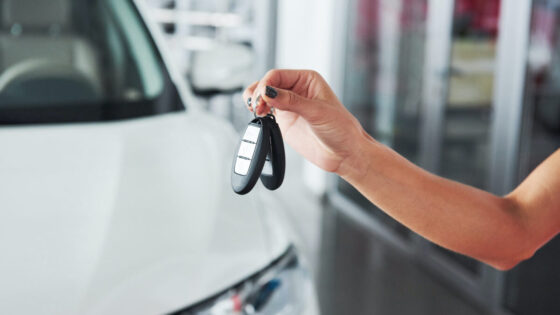Leasing a Car with Bad Credit: Your Guide to Affordable Options

Leasing a car with bad credit can be a daunting task, but it’s not impossible. While having a low credit score can limit your options and make the process more challenging, there are still affordable options available. In this guide, we’ll explore the factors that affect leasing a car with bad credit and provide tips on how to secure a lease that fits your budget.
Factors that Affect Leasing a Car with Bad Credit
Leasing a car with bad credit can be challenging because car dealerships and leasing companies use credit scores to determine whether or not to approve a lease application. However, credit scores are not the only factor that affects leasing a car with bad credit. Other factors include income, down payment, and co-signer.
- Credit Score
Your credit score is a significant factor in leasing a car with bad credit. Most leasing companies require a credit score of at least 620 to approve a lease application. However, some leasing companies specialize in subprime leasing, which means they work with individuals who have credit scores below 620. Keep in mind that subprime leasing usually comes with higher interest rates and stricter lease terms.
- Income
Your income is another factor that affects leasing a car with bad credit. Leasing companies want to ensure that you have enough income to make your monthly lease payments. As a rule of thumb, your monthly lease payment should not exceed 20% of your monthly income. If your income is not enough to meet this requirement, you may need to consider a cheaper car or a longer lease term.
- Down Payment
A down payment is a significant factor in leasing a car with bad credit. A larger down payment can improve your chances of getting approved for a lease and lower your monthly lease payments. As a general rule, you should aim for a down payment of at least 20% of the car’s value. If you cannot afford a down payment, some leasing companies may offer zero-down lease options, but these often come with higher monthly payments.
- Co-Signer
Having a co-signer can also increase your chances of getting approved for a lease with bad credit. A co-signer is someone who signs the lease agreement with you and agrees to be responsible for making payments if you cannot. A co-signer with good credit can improve your chances of getting approved for a lease and may also help you secure better lease terms.
Subprime Leasing
If you have bad credit and are looking to lease a car, subprime leasing might be an option to consider.
Subprime leasing is a type of leasing that is specifically designed for individuals with poor credit. When you lease a car through a subprime lease, the leasing company takes into account your credit history and offers you a lease with terms that are tailored to your financial situation. Subprime leases usually come with higher interest rates and more fees than traditional leases, but they can be a good option for individuals who don’t qualify for traditional leases.
Advantages and Disadvantages of Subprime Leasing
One advantage of subprime leasing is that it can be a way for individuals with bad credit to get a car. Without a car, it can be difficult to get to work or take care of other responsibilities. Subprime leasing can provide a solution that allows you to get a car and start rebuilding your credit.
However, there are also some disadvantages to subprime leasing. The interest rates and fees are often higher than traditional leases, which means that you’ll end up paying more for the car over time. Additionally, the terms of the lease might be less favorable, which could make it more difficult to stay on top of payments.
Here are some statistics about saving money with car lease link

What are the benefits and drawbacks of entering into a lease-to-own agreement, and how does it differ from a traditional lease or purchase?
Another option to consider if you have bad credit is lease-to-own.
- Lease-to-Own
Lease-to-own is a type of financing that allows you to lease a car with the option to buy it at the end of the lease term. Unlike traditional leases, lease-to-own agreements usually last longer and require lower monthly payments. At the end of the lease term, you have the option to buy the car for a predetermined price.
- Advantages and Disadvantages of Lease-to-Own
One advantage of lease-to-own is that it can be a more affordable option for individuals with bad credit. Because the monthly payments are lower, it can be easier to stay on top of payments and avoid defaulting on the lease. Additionally, at the end of the lease term, you have the option to buy the car, which means that you can build equity in the vehicle.
However, there are also some disadvantages to lease-to-own. The interest rates are often higher than traditional leases, which means that you’ll end up paying more for the car over time. Additionally, the predetermined price to buy the car at the end of the lease term might be higher than the market value, which means that you could end up paying more than the car is worth.
What are some tips for finding lease deals for individuals with bad credit?
If you have bad credit, leasing a car may seem impossible. However, some car dealerships offer lease deals specifically for those with less-than-perfect credit. These deals may have higher interest rates or require a larger down payment, but they can still be an affordable option for those who want to lease a car.
- Lease Deals for Bad Credit
Lease deals for bad credit are special offers from car dealerships that are designed to help people with low credit scores to lease a car. These deals typically have higher interest rates than traditional leases, but they may also come with a lower down payment requirement or shorter lease term. Some dealerships may also offer subprime leasing or lease-to-own options, which can be good alternatives for those with bad credit.
- Advantages and Disadvantages of Lease Deals
The main advantage of lease deals for bad credit is that they make it possible for people with low credit scores to lease a car. This can be particularly helpful for those who need a car for work or other important activities. Lease deals can also have lower monthly payments than buying a car, which can make them more affordable for those on a tight budget.
However, there are also some disadvantages to lease deals for bad credit. The higher interest rates can make the total cost of the lease much higher than a traditional lease. Additionally, if you miss a payment or default on the lease, it can further damage your credit score.
What is the impact of credit score on leasing a car and how does it affect the terms of the lease agreement?
Your credit score is one of the most important factors that car dealerships consider when you apply to lease a car. A credit score is a numerical representation of your creditworthiness, based on your credit history. A higher credit score typically means that you are less of a risk to lenders and leasing companies.
If you have bad credit, it may be more difficult to get approved for a lease, or you may only be approved for a subprime lease with less favorable terms. Additionally, a lower credit score may mean that you have to pay a higher interest rate, which can make the lease more expensive overall.
To improve your chances of being approved for a lease and to get better lease terms, it’s important to work on improving your credit score. This can include paying your bills on time, paying down your debts, and disputing any errors on your credit report.
Tips to Improve Your Credit Score
If you have bad credit and want to lease a car, it’s a good idea to work on improving your credit score. Here are some tips to help you get started:
- Check Your Credit Report
First, you need to know where you stand. Check your credit report from all three major credit bureaus (Equifax, Experian, and TransUnion) to make sure there are no errors or inaccuracies. If you find any mistakes, dispute them with the credit bureau.
- Pay Bills on Time
Your payment history is the most important factor in your credit score. Make sure you pay all of your bills on time, including credit cards, loans, and utilities.
- Pay Off Debt
Reducing your outstanding debt can improve your credit utilization ratio, which is the second most important factor in your credit score. Aim to keep your credit utilization ratio below 30%.
- Keep Credit Utilization Low
Try to keep your credit utilization ratio low by using credit cards sparingly and paying off balances in full each month. Don’t close old credit accounts, as this can shorten your credit history and hurt your score.
- Avoid Applying for Too Much Credit
Applying for too much credit can lower your score, as it can be seen as a sign of financial desperation. Only apply for credit when you really need it.
FAQ
Yes, it is possible to lease a car with bad credit, but you may need to put down a larger down payment or have a co-signer.
Subprime leasing is a type of leasing designed for people with poor credit. It usually involves higher interest rates and stricter requirements.
Lease-to-own is a type of leasing where you make payments towards owning the car at the end of the lease term. It can be a good option for those with bad credit, but it may also come with higher fees and interest rates.
Lease deals for bad credit are special promotions offered by dealerships to make leasing more affordable for those with poor credit. These deals may involve lower down payments, lower monthly payments, or other incentives.
Your credit score is one of the most important factors in determining your eligibility for a car lease. A higher credit score can lead to lower interest rates and better lease terms. If you have bad credit, you may need to look for subprime leasing options or work on improving your credit score before leasing a car.


